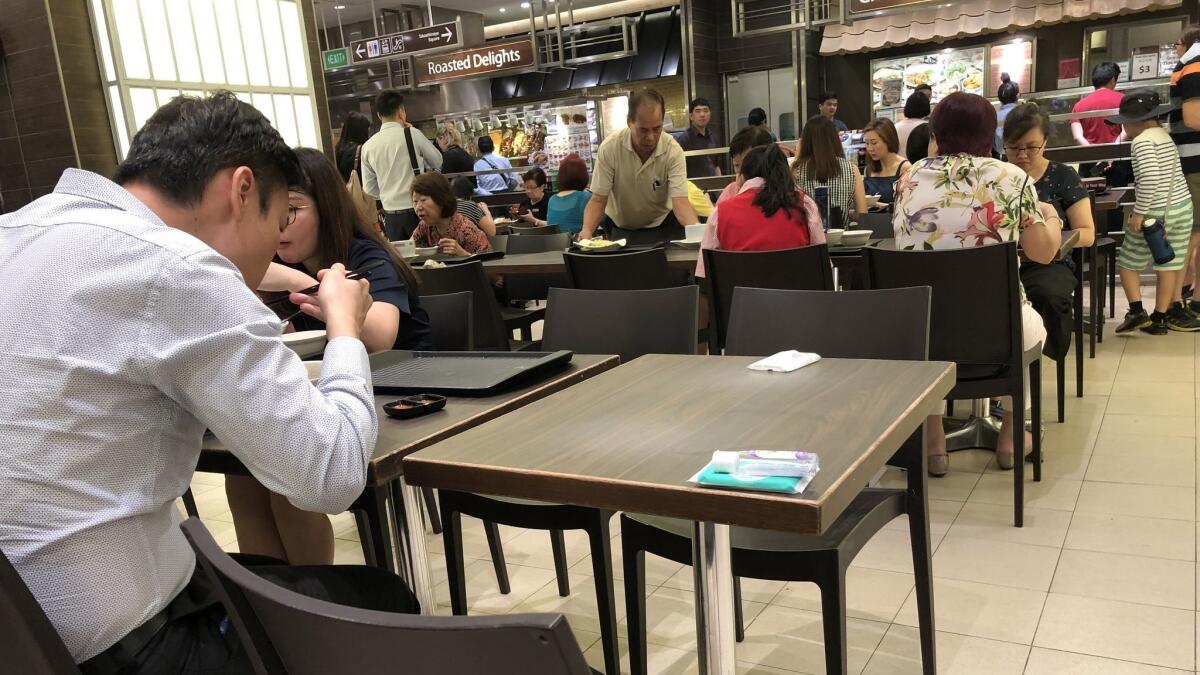Singapore’s ‘kiasu’ culture makes FOMO look like child’s play

- Share via
Reporting from Singapore — Long before Americans discovered FOMO — the fear of missing out —Singaporeans were fixated with its more excessive forebear, kiasu.
Taken from the Chinese dialect Hokkien, kiasu translates to a fear of losing out, but encompasses any sort of competitive, stingy or selfish behavior commonly witnessed in this highflying city-state.
If you stand in line for hours just because there’s a gift at the end, then you’re kiasu.
If you claim a spot at a table at a busy food court with a packet of tissues while you wander off in search of grub, you’re kiasu.
If you’re a parent who volunteers hours of your free time at a school just so your offspring has a better chance of enrolling there one day, then you’re most definitely kiasu.
It’s a survival instinct born out of Singapore’s dominant Chinese culture and deep-rooted insecurity as a blip on the map, one that’s only slightly bigger than the San Fernando Valley.
Letting opportunity pass is tantamount to failure, the thinking goes. And if you do, you have no one to blame but yourself.
“The national narrative is that we are a small country in a very large world,” said Shiao-yin Kuik, a former nominated member of Parliament, an honorary position. “We have very limited resources. If we don’t fight for our own future, no one else will.”
Kiasu (pronounced kee-ah-sue) embodies a sort of unofficial national character, not unlike Japan’s harmonious wa or Britian’s stoic stiff upper lip. It’s an inescapable aspect of life in this country of 5.6 million that drives people to try and outdo one another.
“It was inculcated in me since I was young,” said Rachel Yeo, 24, a senior studying journalism at the National University of Singapore. “Nothing short of the best was expected of me.”
Yeo’s neighborhood growing up boasted one of the top primary schools in Singapore, Rosyth School. To ensure a place there, Yeo’s mother had to compile hours of volunteer work. At least twice a week, she read to students at the school before heading to work. Doing anything less risked losing her daughter’s place to someone else.
“She’s a tiger mom,” said Yeo, who was also enrolled in rigorous after-school tutoring programs, a private industry that has grown into a $1-billion business here because of the parental arms race.
The volunteer system in schools breeds another layer of competition. Parents complain about other parents who have exceeded their quota for hours, but continue to hog opportunities to volunteer.
“People feel like others have to lose in order to win,” said Donald Low, a closely-followed economist and former public official.
Foreign policy in Singapore isn’t immune to kiasu either. The feeling of vulnerability it engenders helps explain Singapore’s outsize spending on defense, which at over $10 billion, is more than that of any other country in Southeast Asia.
The dread of having someone steal your lunch could also be driving Singapore’s hardening stance against Malaysia in a territorial dispute over a sliver of airspace and sea between the two countries.
“Politicians were openly calling for people to stand up and defend the nation over what seems to be technical differences,” said Ja Ian Chong, a political scientist at the National University of Singapore.
“That the state and Singaporeans were ready to treat the issue as existential suggested a deep sense of fear,” he added.
For an earlier generation, that fear propelled Singapore’s improbable success after it broke away from Malaysia in 1965 to later become one of the richest countries in the world on a per capita basis.
But a fear of losing can also trigger paralysis when it comes to risk-taking.
Kuik, the former member of parliament, said Singaporeans today need to be inspired and not cowered.
“There’s a stronger desire to move beyond” Singapore’s origin story, she said, “and really try to explore a larger story, not driven by fear, but ambition.”
There are modest signs of a kiasu backlash, including last year when a small group of parents formed “Life Beyond Grades,” an organization that seeks to relieve academic pressure on children to focus on their wider well-being.
It’s an uphill struggle. Singaporeans are exceptionally self-aware of their reputation — even without reminding from their traditional Malaysian rivals, who are prone to calling the country Kiasuland.
A survey released last year by the Institute of Policy Studies, a local think tank, found that Singaporeans perceived their society to be kiasu more than any other trait.
One of the country’s most famous comic strips was centered on a bespectacled character named Mr. Kiasu. The 1990s series featured titles such as “Everything Also Must Grab” and “Everything Also Number One.”
Giant, a local supermarket chain, ran a contest in 2017 to determine which neighborhood was the most kiasu. The winner, an eastern town called Tampines, impressed with a high percentages of residents admitting to excessively pressing the crosswalk button.
They also fessed up in large numbers to reserving tables at busy coffee shops with a tissue packet or umbrella rather than more considerately ordering their food first and then finding a place to sit — a widespread practice known in Singlish as chope (You can also chope a parking space by having someone stand in it).
Giant reportedly rewarded Tampines residents with free drinks, ice cream and more tissue packets for choping.
There’s “an ambivalence about being kiasu,” said Chong, the political scientist. “On one hand, there are Singaporeans who wear it like a mark of national character, even pride. Others laugh at it, and still others see being kiasu as being a bit of an embarrassment due to the over-the-top behavior it can encourage.”
Nowhere is that more obvious than in Singapore’s queuing culture. The fear of losing out has created a herd mentality when it comes to lines, especially at the city’s famous open-air food courts, known as hawker centers.
“When you see a queue snaking, it means the food must be good, that it’s something you should try,” said Yeo, the journalism student. “I just returned from visiting Taiwan and saw long lines for food. Half the people were Singaporean.”
Some lines are still talked about today, like the time when thousands of Singaporeans thronged outside McDonald’s restaurants in a kiasu-crazed bid to score free Hello Kitty toys.
The pull to line up has even inspired a business, iQueue. The service, which is similar to errand apps such as TaskRabbit, gets up to 50 requests a month to stand in line for things such as boba tea or concert tickets to see the band BTS.
Justin Zheng, a manager at the company, said he queued in line for 12 hours outside a prestigious art class last month for parents who wanted to register their elementary-school-aged child.
Zheng arrived at 7 p.m. the night before the doors opened and still found someone ahead of him in line. By midnight, there were 100 in line. By the next morning, he estimates there were twice as many people.
The parents next to him weren’t even taken aback that Zheng didn’t have any kids and was hired to be there. Instead, they took down his number. Anything to gain an edge, they told him.
“It’s in our blood,” said Zheng, who was paid $110 to line up for half a day. “You realize you have to work harder to be earlier than the next guy.”
david.pierson@latimes.com | Twitter: @dhpierson
More to Read
Sign up for Essential California
The most important California stories and recommendations in your inbox every morning.
You may occasionally receive promotional content from the Los Angeles Times.














